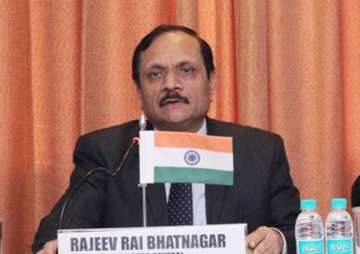Two days after CRPF lost 25 men in a deadly Maoist attack in Sukma district of Chhattisgarh, the paramilitary force today got a new and full-fledged chief.
The government has appointed senior IPS officer Rajiv Rai Bhatnagar as the new Director General (DG) of the Central Reserve Police Force (CRPF) and has attempted to galvanise its security apparatus by ordering a revamp of the intelligence gathering mechanism.
The absence of a full-fledged chief of the force had invited criticism after the Sukma attack which resulted in the death of 25 men.
Bhatnagar, a 1983 batch officer of Uttar Pradesh cadre, was appointed to the post nearly two months after the retirement of previous incumbent K. Durga Prasad on February 28.
Additional Director General Sudeep Lakhtakia, a 1981 batch IPS officer, was handling additional charge as CRPF DG.
Prasad headed the force as its chief for one year from March 1, 2016 to February 28, 2017.
Bhatnagar is currently serving as Director General of the Narcotics Control Bureau - an ADG rank post which has temporarily been upgraded to a Special Director General rank.
After dilly dallying for almost two months, the government finally appointed a full-fledged Director General of the Central Reserve Police Force.
Bhatnagar will lead the three lakh-strong CRPF at a time when the force has suffered reverses in the theatre of Naxal violence and is dealing with mounting protests in Jammu and Kashmir.
Senior IPS officer R K Pachnanda was also appointed as the DG of Indo Tibetan Border Police force.
Pachnanda is a 1983 batch IPS officer of West Bengal cadre.
Govt plans to revamp intel mechanism
The Centre also plans to procure advanced aerial surveillance equipment, including foliage penetration radar, to monitor the activities of Naxals, who operate in thick forests in Chhattisgarh and other states.
The Home Ministry officials said initial reports from the ground indicated that the nearly 100-member CRPF team that came under fierce attack in Chhattisgarh's Sukma did not follow the Standard Operating Procedure, which resulted in heavy casualties.
A high-level meeting chaired by Home Minister Rajnath Singh today decided to strengthen the human intelligence network in Maoist-hit areas to minimise casualties of security forces engaged in anti-naxal operations.
The meeting stressed on revamping the intelligence gathering mechanism, meticulously analysing the ongoing operations, identifying problem areas and resolving them for better results.
The top security brass, including National Security Advisor Ajit Doval, Union Home Secretary Rajiv Mehrishi and others focused on re-calibration of the anti-naxal strategy, and discussed as to how to make it more effective and minimise casualties.
The extra-stress on human intelligence stemmed from reports that the naxalite guerrillas attacked the CRPF team after taking shelter in the homes of local tribals without the security forces getting a whiff of it.
The foliage penetration radar is the need of the hour and the government was looking for its procurement as early as possible, a senior Home Ministry official said.
The radar can pick up the movement of Naxals on the ground and also click pictures piercing through thick foliage.
Latest India News
